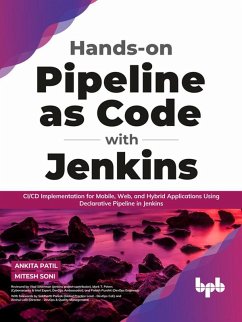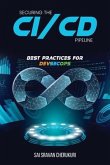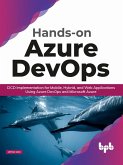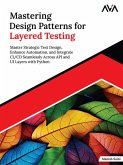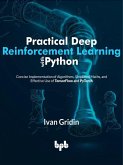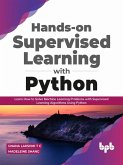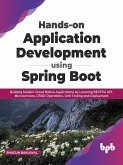DESCRIPTION
The main objective of the book is to create Declarative Pipeline for programming languages such as Java, Android, iOS, AngularJS, NodeJS, Flutter, Ionic Cordova, and .Net. The book starts by introducing all the areas which encompass the field of DevOps Practices. It covers definition of DevOps, DevOps history, benefits of DevOps culture, DevOps and Value Streams, DevOps practices, different Pipeline types such as Build Pipeline, Scripted Pipeline, Declarative Pipeline, and Blue Ocean. Each chapter focuses on Pipeline that includes Static Code Analysis using SonarQube or Lint tools, Unit tests, calculating code coverage, publishing unit tests and coverage reports, verifying the threshold of code coverage, creating build/package, and distributing package to a specific environment based on the type of programming language. The book will also teach you how to use different deployment distribution environments such as Azure App Services, Docker, Azure Container Services, Azure Kubernetes Service, and App Center.
By the end, you will be able to implement DevOps Practices using Jenkins effectively and efficiently.
KEY FEATURES
● Understand how and when Continuous Integration makes a difference
● Learn how to create Declarative Pipeline for Continuous Integration and Continuous Delivery
● Understand the importance of Continuous Code Inspection and Code Quality
● Learn to publish Unit Test and Code Coverage in Declarative Pipeline
● Understand the importance of Quality Gates and Build Quality
WHAT YOU WILL LEARN
● Use Multi-Stage Pipeline (Pipeline as a Code) to implement Continuous Integration and Continuous Delivery.
● Create and configure Cloud resources using Platform as a Service Model
● Deploy apps to Azure App Services, Azure Kubernetes and containers
● Understand how to distribute Mobile Apps (APK and IPA) to App Center
● Improve Code Quality and Standards using Continuous Code Inspection
WHO THIS BOOK IS FOR
This book is for DevOps Consultants, DevOps Evangelists, DevOps Engineers, Technical Specialists, Technical Architects, Cloud Experts, and Beginners. Having a basics knowledge of Application development and deployment, Cloud Computing, and DevOps Practices would be an added advantage.
AUTHOR BIO
Mitesh is a DevOps engineer. He is in love with the DevOps culture and concept. Continuous improvement is his motto in life with existing imperfection. His primary focus is on the improvement of the existing culture of an organization or a project using Continuous Integration and Continuous Delivery.
Ankita is a DevOps evangelist. She is a continuous learner and practitioner of Agile and DevOps. As a change agent, she always tries to bring change in an organization to get maximum benefits of DevOps. So, she wants to share her knowledge and make sure IT professionals are trained and empowered to make those changes.
Dieser Download kann aus rechtlichen Gründen nur mit Rechnungsadresse in A, B, CY, CZ, D, DK, EW, E, FIN, F, GR, H, IRL, I, LT, L, LR, M, NL, PL, P, R, S, SLO, SK ausgeliefert werden.
Hinweis: Dieser Artikel kann nur an eine deutsche Lieferadresse ausgeliefert werden.

